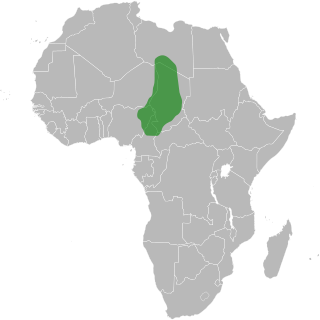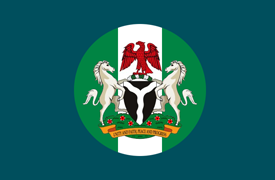
The Kanem–Bornu Empire existed in areas which are now part of Nigeria, Niger, Cameroon, Libya and Chad. It was known to the Arabian geographers as the Kanem Empire from the 8th century AD onward and lasted as the independent kingdom of Bornu until 1900.

Islam is one of the largest religions in Nigeria and the country has the largest Muslim population in Africa. In 2018, the CIA World Factbook estimated that 53.5% of Nigeria's population is Muslim. Islam is predominantly concentrated in the northern half of the country, with a significant Muslim minority existing in the southern region. Most of Northern Nigeria is governed under Sharia law, while the rest of the country is governed under secular law.
Ngazargamu, Birni Ngazargamu, Birnin Gazargamu, Gazargamo or N'gazargamu, was the capital of the Bornu Empire from ca. 1460 to 1809. Situated 150 km (93 mi) west of Lake Chad in the Yobe State of modern Nigeria, the remains of the former capital city are still visible. The surrounding wall is 6.6 km (4.1 mi) long and in parts it is still up to 5 m (16 ft) high.

Maiduguri is the capital and the largest city of Borno State in north-eastern Nigeria. The city sits along the seasonal Ngadda River which disappears into the Firki swamps in the areas around Lake Chad. Maiduguri was founded in 1907 as a military outpost by the British and has since grown rapidly with a population exceeding a million by 2007.

Yobe is a state located in northeastern Nigeria. A mainly agricultural state, it was created on 27 August 1991. Yobe State was carved out of Borno State. The capital of Yobe State is Damaturu, and its largest and most populated city is Potiskum.

Borno State is a state in the North-East geopolitical zone of Nigeria, bordered by Yobe to the west, Gombe to the southwest, and Adamawa to the south while its eastern border forms part of the national border with Cameroon, its northern border forms part of the national border with Niger, and its northeastern border forms all of the national border with Chad, being the only Nigerian state to border three foreign countries. It takes its name from the historic emirate of Borno, with the emirate's old capital of Maiduguri serving as the capital city of Borno State. The state was formed in 1976 when the former North-Eastern State was broken up. It originally included the area that is now Yobe State, which became a distinct state in 1991.
Idris Alooma, Idris ibn 'Ali (Alooma), or Idriss Alaoma, (r. 1570–1602/03 or 1580–1617) was Mai (king) of the Kanem-Bornu Empire, located mainly in Chad, Cameroon, Niger and Nigeria. His name is more properly written Idris Alawma or Idris Alauma. An outstanding statesman, under his rule Kanem-Bornu touched the zenith of its power. Idris is remembered for his military skills, administrative reforms and Islamic piety. His feats are mainly known through his chronicler Ahmad bin Fartuwa.
Ahmad bin Furtu or Ibn Furtu was the sixteenth century grand Imam of the Bornu Empire and the chronicler of Mai Idris Alooma (1564–1596).
The Ngizim people live in Yobe State, northeastern Nigeria. As of 1993, there were an estimated 80,000 Ngizim. The tribe lives primarily in Potiskum, the largest city in Yobe State and originally a Ngizim town, as well as the areas to the east and south of the city. Ngizim populations once inhabited parts of Borno and Jigawa states, but have since lost their cultural identity after being assimilated into other ethnic groups. The Ngizim speak a Chadic language also called Ngizim.

Boko Haram, officially known as Jamā'at Ahl as-Sunnah lid-Da'wah wa'l-Jihād, is an Islamist militant organization based in northeastern Nigeria, which is also active in Chad, Niger, northern Cameroon, and Mali. Boko Haram was the world's deadliest terror group during part of the mid-2010s according to the Global Terrorism Index. In 2016, the group split, resulting in the emergence of a hostile faction known as the Islamic State's West Africa Province.
Michika (Mwe-cika) is a town and Local Government Area in Adamawa State, Nigeria, it is the administrative headquarters of the local government. It is in Northern Adamawa State and located directly across the border from the famous tourist site of Mcedigyi in vecemwe Rhumsiki in Cameroon. Mwe-cika (Michika) is the fourth largest town in Adamawa State.
Marte is a Local Government Area of Borno State, Nigeria, on the western coast of Lake Chad. Its headquarters are in the town of Marte
Damboa is a Local Government Area of Borno State, Nigeria. Its headquarters are in the town of Damboa. It has an area of 6,219 km² and had a population of 233,200 at the 2006 census.

The Boko Haram insurgency began in July 2009, when the militant Islamist and jihadist rebel group Boko Haram started an armed rebellion against the government of Nigeria. The conflict is taking place within the context of long-standing issues of religious violence between Nigeria's Muslim and Christian communities, and the insurgents' ultimate aim is to establish an Islamic state in the region.

The Komadugu Gana River or Misau River is a river in the Chad Basin in northeastern Nigeria that joins the Yobe River at Damasak, in the Mobbar Local Government Area of Borno State. It rises north of Bauchi.
Timeline of the Boko Haram insurgency is the chronology of the Boko Haram insurgency, an ongoing armed conflict between Nigerian Islamist group Boko Haram and the Nigerian government. Boko Haram have carried out many attacks against the military, police and civilians since 2009, mostly in Nigeria. The low-intensity conflict is centred on Borno State. It peaked in the mid 2010s, when Boko Haram extended their insurgency into Cameroon, Chad and Niger.

The Sambisa Forest is a forest in Borno State, northeast Nigeria. It is in the southwestern part of Chad Basin National Park, about 60km southeast of Maiduguri, the capital of Borno State. It has an area of 518 km².
The following lists events from 2014 in Nigeria.
The 2015 Baga massacre was a series of mass killings carried out by the Boko Haram terrorist group in the north-eastern Nigerian town of Baga and its environs, in the state of Borno, between 3 January and 7 January 2015.
Battle of Damasak took place on the 18 March 2015 when Nigerien and Chadian armies attacked Boko Haram the Nigerian town of Damasak. Boko Haram was pushed out of the town after less than a day of heavy fighting. Damasak was captured on the 24th of November 2014 by Boko Haram and was under their control until this battle. By the time the town was recaptured it had been mostly deserted..The civilians who remained were too old or too sick to leave. After the battle Chadian soldiers set up camps outside of the town and two Chadian helicopters arrived with supplies.









